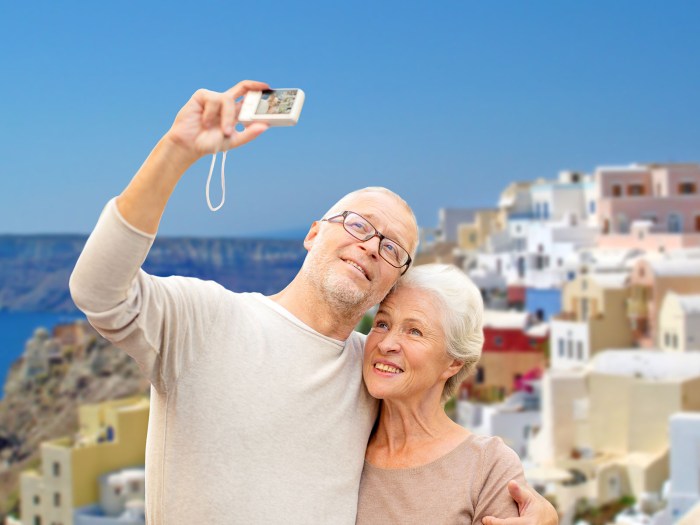Travel Ideas For Seniors: Planning the perfect getaway for seasoned adventurers requires careful consideration. This guide navigates the unique needs and desires of older travelers, offering insights into accessible destinations, budget-friendly options, and enriching experiences designed for relaxation and enjoyment. From selecting the right transportation and accommodation to managing health concerns and packing efficiently, we’ll equip you with the knowledge to plan a memorable and worry-free journey.
We explore a range of destinations, highlighting accessibility features and comparing different travel styles, such as cruises versus European city breaks. The importance of health and wellness is emphasized, with advice on vaccinations, travel insurance, and managing pre-existing conditions. We also delve into budget-conscious travel options, suggesting strategies for saving money without compromising on quality. Finally, we offer curated activity suggestions, focusing on engaging experiences that cater to varying interests and energy levels.
Accessible Travel Destinations: Travel Ideas For Seniors

Planning a trip as a senior doesn’t mean sacrificing adventure. Many destinations worldwide cater specifically to the needs of older travelers, offering accessible infrastructure and amenities that ensure a comfortable and enjoyable experience. Choosing the right location can significantly impact the overall quality of your journey.
Five Accessible Destinations for Seniors
Several destinations stand out for their commitment to accessibility. These locations offer a range of features designed to accommodate seniors’ specific needs, from well-maintained pathways to accessible transportation and readily available assistance. Careful consideration of these factors can help ensure a seamless and stress-free trip.
| Destination | Accessibility Features | Cost Estimate (per person, 7 days) | Recommended Travel Time |
|---|---|---|---|
| Amsterdam, Netherlands | Well-maintained, flat pavements; excellent public transport with low-floor trams and buses; many wheelchair-accessible hotels and attractions; audio guides available at museums. | $2,500 – $4,000 | Spring or Autumn |
| San Diego, California, USA | Numerous accessible beaches with ramps and walkways; accessible public transport; many hotels with accessible rooms; numerous attractions with wheelchair access; relatively warm climate year-round. | $1,800 – $3,500 | Spring or Fall |
| Quebec City, Canada | Many historic sites with accessible entrances and elevators; cobblestone streets, but many areas are well-paved and relatively flat; accessible public transport; many hotels with accessible rooms. | $2,000 – $3,800 | Summer or Early Autumn |
| Bath, England | Relatively flat terrain, making it easy to navigate; accessible public transport; many historic sites with accessible entrances; numerous hotels with accessible rooms. | $2,200 – $4,000 | Spring or Summer |
| Hawaii (Oahu), USA | Accessible beaches with ramps and walkways; many hotels with accessible rooms; accessible transportation options; various attractions with wheelchair access. Note: some areas may involve more challenging terrain. | $2,800 – $5,000 | Year-round, avoiding hurricane season (typically late summer/early autumn). |
Comparing Accessibility: European City vs. Cruise
Amsterdam, a European city, and a Caribbean cruise offer contrasting accessibility experiences. Amsterdam excels in its accessible public transport and generally flat terrain, making independent exploration relatively easy for seniors with mobility challenges. However, navigating cobblestone streets in some older areas may present difficulties. In contrast, a cruise ship typically offers readily available assistance, accessible cabins, and elevators, minimizing physical exertion.
However, the confined environment and reliance on ship-provided services might feel less independent for some. The choice depends on individual preferences regarding independence versus convenience.
Health and Wellness Considerations
Planning a trip requires careful consideration of health and wellness, especially for seniors. Factors such as pre-existing conditions, medication requirements, and potential health risks associated with travel destinations must be carefully assessed to ensure a safe and enjoyable experience. Proactive planning minimizes potential problems and maximizes the benefits of travel.Prioritizing health and safety during travel is paramount for seniors.
This involves comprehensive preparation, encompassing pre-trip health screenings, appropriate travel insurance, and strategies for managing existing health conditions while abroad. Ignoring these aspects can lead to unexpected complications, potentially jeopardizing the entire trip.
Essential Health Precautions and Travel Insurance
Selecting comprehensive travel insurance is crucial for seniors. Policies should cover emergency medical evacuation, repatriation, and hospitalization costs, which can be significantly higher abroad. Consider policies that specifically cater to the needs of older travelers, often including provisions for pre-existing conditions. Furthermore, researching the healthcare infrastructure of the destination is advisable; understanding the availability and quality of local medical facilities can influence insurance choices and preparedness.
For example, a policy covering helicopter evacuation might be essential in remote mountainous regions, while a policy with extensive coverage for chronic condition management would be necessary for individuals with pre-existing conditions like diabetes or heart disease.
Recommended Vaccinations and Health Screenings
Vaccination requirements and recommended health screenings vary significantly depending on the travel destination. Consult a physician or travel clinic well in advance of the trip to determine the necessary vaccinations and screenings based on the itinerary. For example, travel to tropical regions may necessitate vaccinations against yellow fever, typhoid, and hepatitis A and B. Similarly, travel to areas with high malaria risk requires malaria prophylaxis.
Comprehensive health screenings, including blood pressure and cholesterol checks, might be beneficial before embarking on a long journey. The Centers for Disease Control and Prevention (CDC) website offers detailed information on recommended vaccinations and health precautions for various destinations.
Managing Common Health Concerns During Travel
Managing existing health concerns during travel requires meticulous planning. This involves carrying sufficient medication, with prescriptions and copies readily available. Additionally, understanding the local regulations regarding medication import is crucial. For individuals with mobility challenges, researching accessible transportation options and accommodations is vital. Consider using mobility aids like canes or walkers and informing airlines or tour operators about any special needs.
Packing a well-stocked first-aid kit containing essential medications and supplies for common ailments, like indigestion or minor cuts, is also strongly recommended. Individuals with chronic conditions should pack enough medication for the duration of the trip, plus extra in case of delays.
Budget-Friendly Travel Options
For seniors seeking enriching travel experiences without breaking the bank, strategic planning is key. Budget travel doesn’t necessitate sacrificing comfort or enjoyment; rather, it involves prioritizing needs, exploring alternative options, and embracing flexibility. This section Artikels three budget-friendly travel options tailored to the senior traveler, considering accommodation, transportation, and activities. A sample budget for a week-long trip is also provided to illustrate practical cost management.
Three Budget-Friendly Travel Options for Seniors
Choosing the right travel option significantly impacts the overall cost. Three distinct approaches, each offering unique advantages, are detailed below.
- Option 1: Road Trip in an RV. RVs offer self-contained accommodation, eliminating hotel costs. Seniors can enjoy the flexibility of exploring at their own pace, stopping at scenic overlooks and charming towns along the way. The initial investment in an RV can be offset by long-term savings on accommodation. Activities are often free or low-cost, such as hiking, visiting national parks (with senior discounts), and picnicking.
Transportation is inherently included. Potential drawbacks include the cost of fuel and maintenance, plus the physical demands of driving and setting up camp. However, many RV parks offer full hookups and amenities, minimizing these challenges.
- Option 2: Cruises for Value-Seekers. While often perceived as luxurious, cruises can be surprisingly budget-friendly, particularly during shoulder seasons or when booking early. Many cruise lines offer all-inclusive packages, bundling accommodation, meals, and onboard entertainment into a single price. Transportation to and from the port may be an additional expense, but it’s often manageable with pre-booked transportation or shared rides. Activities are largely included, but shore excursions can add to the cost.
Choosing a shorter cruise or opting for inside cabins can significantly reduce the overall expenditure. Potential drawbacks include potential crowds and limited flexibility in itinerary.
- Option 3: Train Travel and Budget Accommodation. Train travel offers a scenic and relaxing alternative to flying, particularly for shorter distances. Many countries have excellent rail networks with senior discounts. Accommodation can be kept economical by choosing budget-friendly hotels, guesthouses, or Airbnb options outside city centers. Activities can be planned around free or low-cost attractions, such as walking tours, visiting parks, and exploring local markets.
Potential drawbacks include longer travel times compared to flying and the need for careful planning to maximize value and minimize additional expenses.
Sample Budget: A Week in Portugal, Travel Ideas For Seniors
This sample budget illustrates a week-long trip to Portugal, focusing on budget-conscious choices. Prices are estimates and can vary depending on the season and specific choices.
| Expense Category | Estimated Cost (USD) |
|---|---|
| Round-trip airfare (from a major US city) | $800 |
| Accommodation (7 nights in budget-friendly hotels/Airbnb) | $700 |
| Food (including groceries and some restaurant meals) | $500 |
| Transportation (local buses, trains, and occasional taxis) | $200 |
| Activities and Entrance Fees | $200 |
| Miscellaneous (souvenirs, tips, etc.) | $100 |
| Total Estimated Cost | $2500 |
Cost-Effectiveness of Travel Modes
The cost-effectiveness of various travel modes depends heavily on the distance, time of year, and individual preferences.Flying is generally faster but can be more expensive than train travel, especially for shorter distances. Train travel often offers scenic views and a more relaxed experience. All-inclusive resorts offer convenience but can be pricier than independent travel, where costs can be managed more precisely by selecting budget-friendly options.
Independent travel allows for greater flexibility but requires more planning and research. For seniors, the balance between cost and comfort should be carefully considered, potentially favoring options that minimize stress and physical exertion. For example, a train journey might be preferred over a long flight, despite a slightly higher cost, due to increased comfort and reduced fatigue.
Engaging Activities and Experiences

Planning enriching and manageable activities is crucial for a successful senior travel experience. The key is to balance exploration with relaxation, ensuring the itinerary respects individual energy levels and preferences. A well-structured trip will leave seniors feeling rejuvenated and inspired, not exhausted.
Selecting activities that cater to diverse interests is paramount. This ensures that the trip remains engaging and avoids monotony. Furthermore, incorporating elements of relaxation and mindful rejuvenation prevents travel from becoming overly strenuous.
Engaging Activities for Seniors
The following activities offer a range of options, catering to various interests and physical capabilities. These suggestions prioritize accessibility and manageable participation, ensuring a positive and enjoyable experience for all.
- Cultural: Visiting historical museums with audio guides and comfortable seating, attending local cultural performances (e.g., a classical music concert or a traditional dance show), participating in a hands-on craft workshop (e.g., pottery or painting).
- Historical: Guided walking tours of historical sites at a leisurely pace, exploring historical landmarks with accessible transportation, attending a historical reenactment or lecture.
- Nature-based: Scenic drives through national parks with frequent stops, gentle nature walks on paved trails, enjoying a relaxing boat tour on a calm lake or river.
- Culinary: Taking a cooking class focused on regional cuisine, participating in a wine tasting tour, enjoying leisurely meals at local restaurants with outdoor seating.
- Wellness: Attending a yoga or tai chi class, enjoying a spa treatment (massage, aromatherapy), participating in guided meditation sessions.
- Social: Joining a local group tour or activity, attending a social gathering or event at a senior center, engaging in conversation with locals at a cafe.
- Educational: Attending a lecture or workshop on a topic of interest, visiting a botanical garden or arboretum with informative signage, participating in a bird-watching tour.
- Artistic: Visiting art galleries or museums with accessible entry and seating, attending a play or musical performance, participating in an art appreciation workshop.
- Relaxation: Spending time in a quiet garden or park, reading a book in a comfortable setting, enjoying a leisurely afternoon tea.
- Spiritual: Visiting a place of worship or spiritual significance, attending a religious service or ceremony, practicing mindfulness or meditation in a peaceful environment.
Unique Experiences for Senior Travelers
These experiences emphasize relaxation and enjoyment, ensuring a rejuvenating and memorable trip. They are designed to be easily adaptable to individual preferences and physical limitations.
- A Private Guided Tour of a Historic Garden: Imagine strolling through a meticulously maintained garden, accompanied by a knowledgeable guide who shares the history and significance of each plant and feature. The pace is leisurely, allowing ample time for contemplation and photography. Comfortable seating areas are available for breaks.
- A Wellness Retreat Focused on Gentle Movement and Mindfulness: This experience incorporates gentle yoga, tai chi, and meditation sessions in a serene setting. Nutritional meals are provided, and plenty of time is dedicated to relaxation and personal reflection. Individualized attention ensures that the program caters to the needs of each participant.
- A Slow-Paced Culinary Journey: This involves visits to local farmers’ markets, cooking demonstrations featuring regional specialties, and leisurely meals at charming restaurants. The focus is on savoring the flavors and culture of the destination at a relaxed pace, without rushing from one activity to the next.
Suggested Seven-Day Itinerary
This itinerary prioritizes manageable activities and incorporates ample time for relaxation. It’s a suggestion, adaptable to individual preferences and physical capabilities. The emphasis is on pacing and enjoyment, avoiding over-scheduling.
- Day 1: Arrival and settling in. Gentle walk around the neighborhood.
- Day 2: Visit a historical museum with audio guide. Afternoon relaxation at a local park.
- Day 3: Private guided tour of a historic garden. Evening: Relaxing dinner at a restaurant with outdoor seating.
- Day 4: Scenic drive through a national park. Gentle nature walk on a paved trail.
- Day 5: Wellness retreat: gentle yoga and meditation. Afternoon: Spa treatment.
- Day 6: Slow-paced culinary journey: farmers market visit and cooking demonstration. Evening: Leisurely dinner.
- Day 7: Departure.
Ultimately, the perfect senior travel experience hinges on careful planning and a focus on personal preferences. By considering accessibility, health, budget, and desired activities, seniors can craft unforgettable journeys. This guide serves as a roadmap, empowering travelers to embark on adventures that enrich their lives and create lasting memories. Remember that proactive planning and a focus on well-being are key to a successful and enjoyable trip.

